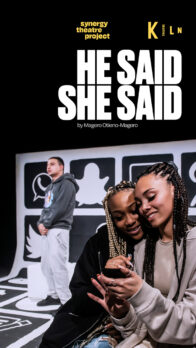Publisher
Synergy Theatre Project
Published
13 Mar 2023
Concern about the influence of social media on violence both in and out of school has been a recurring theme for several years but never more so than since the pandemic. So I was interested to see how He Said, She Said, written by Magero Otieno Magero and directed by Esther Baker, would balance a short runtime of forty minutes with the complex issue on how the proliferation of gossip can influence the consumers and creators of social media.
The cast is a small one, as is typical of theatre companies that deal with complex issues with the aim of touring schools. With a cast of four, we explore the devastating aftermath after Denise (Megan Samuel) encourages Kayla (LJ Johnson) to post a photograph of herself and Yusef (Farshid Rokey) to make Dre (Jermaine Freeman) jealous.
Once the picture is posted, as we often warn young people, Kayla is no longer in control of the photograph and rumours abound that Kayla and Yusef are not just primary school friends but in a relationship. It is a story many Schools Week readers will have probably dealt with in reality, as those in pastoral or behavioural roles unpick the fallout of such events within their school communities. However, in this case, this one act soon spirals out of control and leads to a harrowing end.
The relationship between Dre and Kayla touched upon serious issues around coercion and control, but as is the nature of a forty-minute production, these were not explored. Instead, the fractions in the relationship hung heavy in the air without resolving. I would hope that a skilled teacher with the opportunity to watch this with their students would explore this carefully.
If it’s the power of social media you want to tackle this is a great place to start
The play is punctuated by monologues, allowing the audience to explore more individual characters’ reasoning in more depth. The dialogue takes the form of spoken word, which is characterised by rhyme and wordplay. Spoken word is often used to speak to issues relating to social justice and politics, but it also gives an almost romantic quality to the conversations, which is harshly juxtaposed to the realities of the story.
The stage setting designed by Katy McPhee is simple but effective. A series of social networking icons, distilled in black and white, are both the floor and walls. Some of the icons were familiar to me (Facebook, Pinterest, WhatsApp). Others I did not know at all.
This is a lesson in itself and one not just for the students in our care. It was a stark reminder that as staff we may not use the same platforms as the young people in our care, but having an awareness of their use and misuse can be a vital part of our roles. The ubiquitous nature of social media is reflected in the cast being on stage throughout the performance, symbolising that our children are rarely out of the grips of social media. They (and likely people older than the intended audience) are constantly consuming and using social media in many facets of their lives.
At the end of this performance, and preserved for online viewers, there was a question-and-answer session which made the production even more powerful. The questions from the audience included some you would expect, such as ‘Who do you think is to blame for the play’s outcome?’. My view was different to that of the actors, and that is where the richness of a pastoral discussion comes in. Differing opinions and how we mediate those in the context of a school setting are what makes this an effective educational experience.
The play has an age advisory of thirteen-plus, which makes sense given the themes portrayed are upsetting. Synergy Theatre Project’s website hosts previous productions too, and based on the quality on show here I would recommend searching them for other themes you may want to approach with students. If it’s the power of social media you want to tackle this is a great place to start, but be prepared to have other challenging conversations too – not least about consent and coercion.
He Said, She Said was livestreamed on 13 March. The play and subsequent Q&A are available online here












Your thoughts